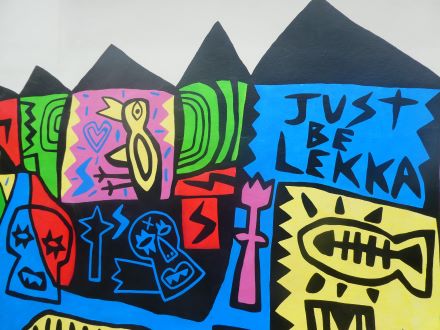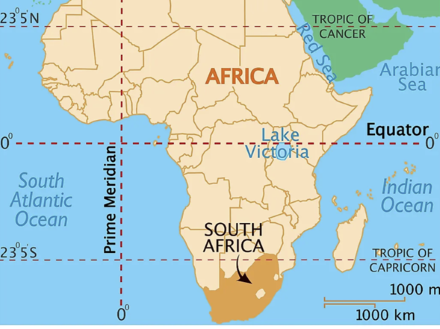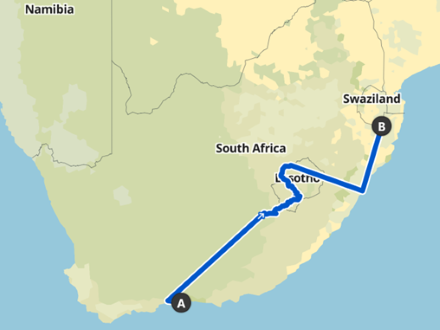
Knysna … Aliwal North – Lady Grey – Telle Bridge – (Lesotho) – Maseru Bridge – Ladybrand – Ficksburg … Durban … Lavumisa (Eswatini border)
21 Nov – 16 Dec, 2022
230 km cycled
Watch the video!
After cycling two months in South Africa, we felt we had given the country a fair twist. So, in order to make it to Eswatini to visit our friends before Christmas, we took a couple of transfers in the Eastern Cape, the Free State and KwaZulu-Natal provinces.
Organising a ride was a challenge in itself as we were being warned left, right and centre about safety issues on local share taxis. The intercity bus companies left at 2am and entailed long waits in city bus stations, and the shuttle services quoted us prices more than what we had paid for our international flights from Switzerland to Angola! Then, as luck would have it, we became acquainted with Keenan, our friendly Uber driver in Knysna, and he came up trumps with a private transfer. Three cheers for Keenan and Edwin for their professional service.
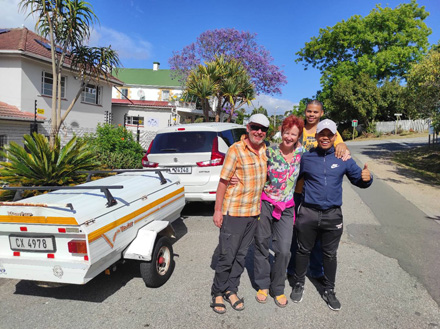
We randomly chose Aliwal North in the Eastern Cape as the destination, presuming from its size that it would be a suitable place for stocking up on supplies for Lesotho.
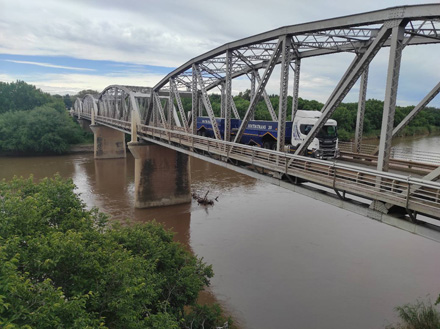
The place was a real eye-opener. Our guesthouse in the green leafy neighbourhood had “fortress” as the Wifi code, and then the walk through town was one experience after the next. Never had we felt so “white” in our lives, and the atmosphere was hostile to say the least. Every street sign was plastered with advertisements for cheap and painless abortions, and the Shoprite supermarket was selling individually wrapped processed cheese by the slice for 2.50 Rand (0.14 Euros). This was a first for us. The local mobile phone shop owner expressed a desire to emigrate as he drew our attention to a six-inch scar between his two eyes and another two on his neck and shoulder after a break-in last month. Needless to say, we tried to keep a low profile and didn’t linger longer than necessary.
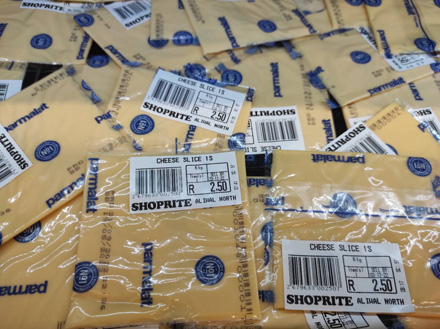
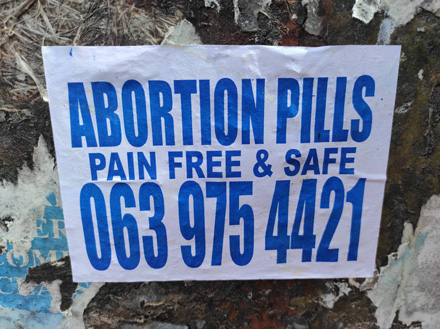
It didn’t take longer than 2km out of town for the tension to lift and the cheerful greetings to recommence. On this stretch, there were a lot of men and women working on the road, and how a job can positively influence one’s self-esteem and outlook on life was evident the whole way to Lady Grey.
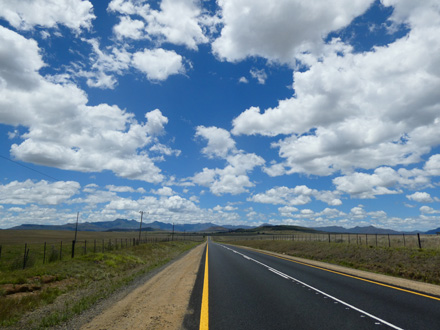
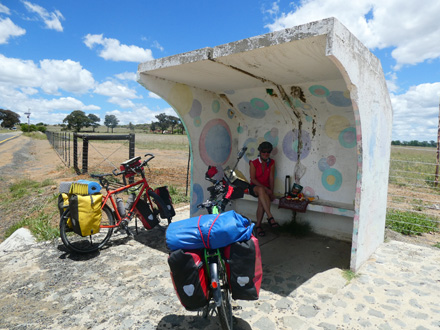
The reason for including Lady Grey on the itinerary was for the Cycle Touring shop – the only one on in Southern Africa stocking Ortlieb panniers. Darina gave in! After 17 years touring with back paniers and a rack pack, she succumbed to front panniers! It wasn’t an easy decision. Having weighed everything that made its way into her panniers before leaving for Africa, she was proud of her 17kg luggage total. What wasn’t factored into the equation, was the weight of food and water in more remote areas that easily brought that load on the back up to 25kgs. It was on the steep uphills that she felt it most. That wheelie sensation that you don’t really need on a rough gravel stretch of 13+%!😝 So, here she is now, new to the bike touring world with a “fully-loaded” bike as the trend shifts to minimal bikepacking gear. And she’s gained 2kgs in the process! It was a good decision nevertheless to spread the load as she also notices that the bike has more stability now on downhills too.


After having lost his glasses a few weeks previously, Kurt was waiting on his new prescription glasses to arrive by courier. This was a blessing in disguise, as we got to enjoy the company of Grant, the owner of the Cycle Touring shop, and his mother Gerda, who happen to be warm-shower hosts. We talked bike and played bike, testing out Grant’s one up, one down Hase Pino tandem bike. Their friendly alpacas kept us company in the garden and we were treated to a mega authentic South African braai (BBQ). South African hospitality strikes again!
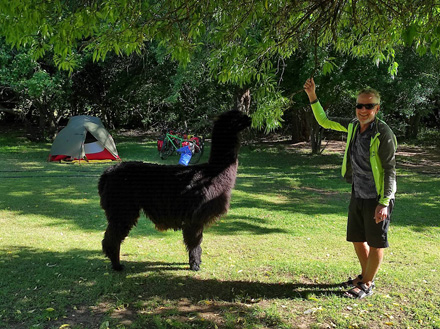
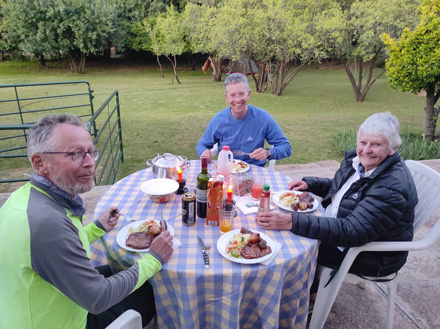
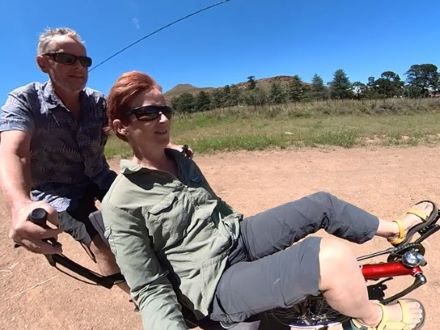
The ride to the border of Lesotho was through the Transkei region; an unoffical republic created during Apartheid, where the Xhosa tribe were encouraged to settle. Although the area was reintegrated into the Eastern Cape Province in 1994, it is still clearly more traditional than neighbouring regions. The mountainous landscape and friendly folk made for very pleasant cycling, despite the condition of the road.

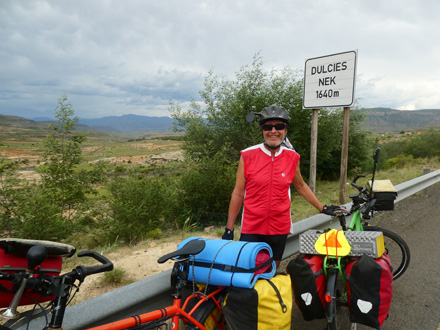
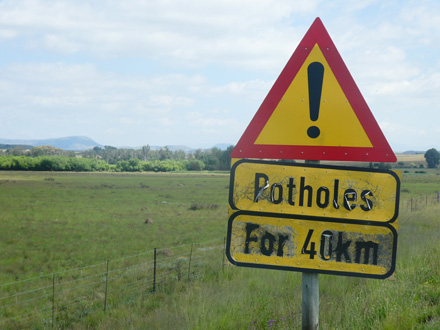
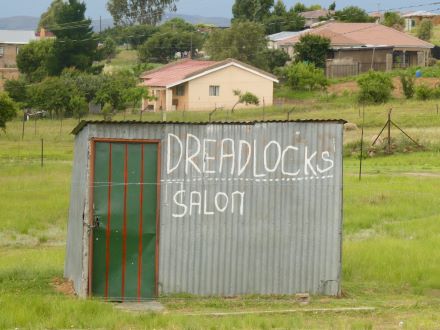
We entered Lesotho at Telle Bridge and spent two weeks tackling 17% inclines in spectacular scenery with exceptionally friendly folk. It was like moving back in time as most travelled on horseback, sporting colourful blankets and practising traditional farming methods. You can read more about our trip in Lesotho here.

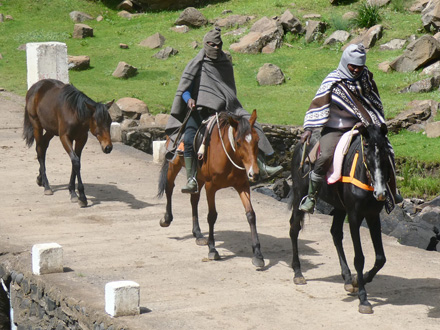
We left Lesotho through the Maseru Bridge border crossing back into South Africa, this time the Free State Province. We enjoyed the flatter scenery, and had a short day into Ladybrand, which, in stark contrast to Lesotho, has numerous sandstone buildings in town dating back to the early 1900s. We opted for a room, and were quickly reminded by Zanalee at Top Guest House what hospitality means in South Africa. It’s not called Top for nothing!
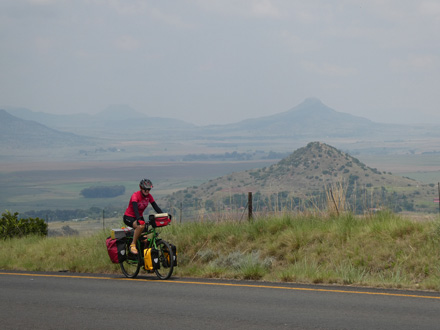

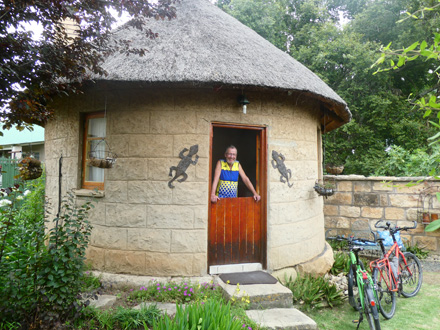
It was a wet ride into Ficksburg with thunder and lightening accompanying us most of the day.
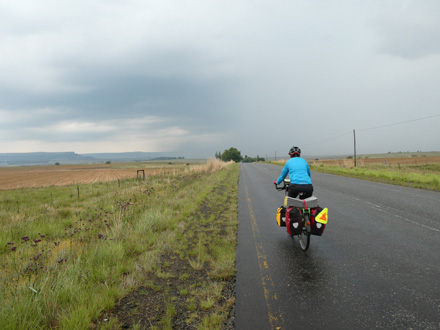
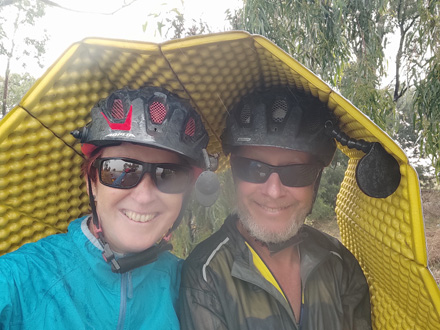
By the time we got to Ficksburg, we were absolutely drenched! The streets were quickly turning into rivers and with load shedding (power cuts) the town looked dismal. When Gavin at Victoria House opened his doors, we thought we had arrived in paradise! And with torrential downpours forecast for the rest of the week, we had absolutely no problem jumping into a shared taxi heading towards the Eswatini border. Cheers Gavin for organising everything.

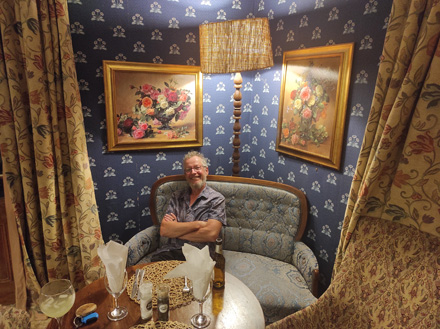
This was probably the worst stretch of paved road we had seen on the whole trip. The Free State Province is famous all over South Africa for their potholes, and according to an anonymous source i.e. Kurt, they have applied for UNESCO World Heritage Status!
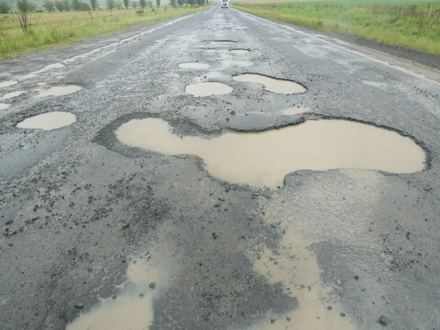
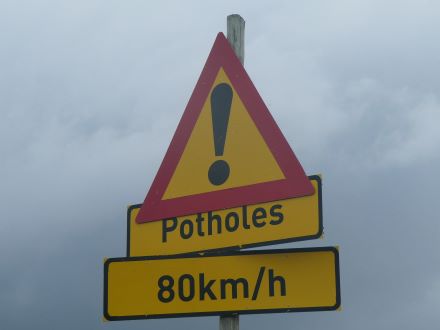
Our trip towards the Eswatini border led through the Golden Gate Highlands National Park, which would be a lovely area to cycle through in drier weather.
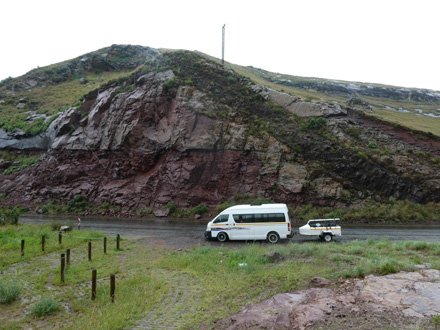
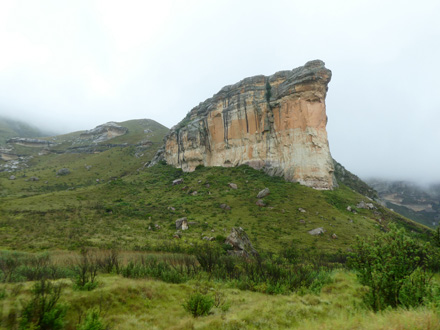
As it happened, we were the only passengers on the bus, and instead of dropping us off in Ladysmith, our friendly driver, Swiso, convinced us to accompany him to Durban, where we would be assured of a better connection to the border. Well, it wasn’t planned, but we got to see this cosmopolitan city, boasting the biggest Indian population outside the sub-continent.
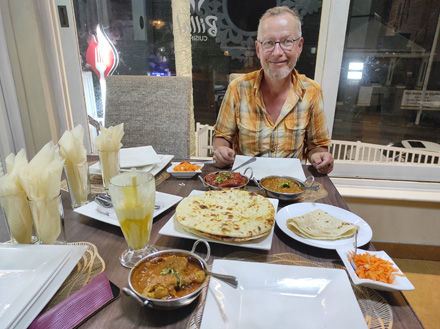
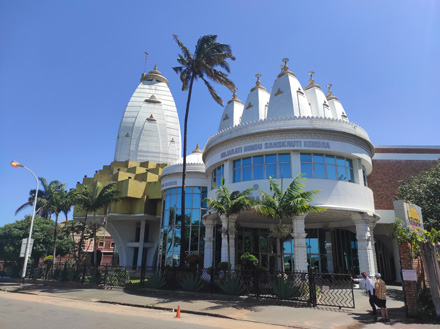
We took a golf cart tour of the Botanical Gardens, which we can highly recommend, not least for the contagious enthusiasm of the entertaining guide.
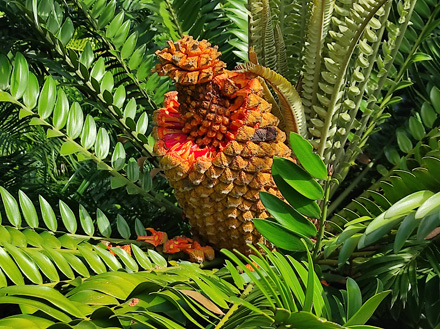

Of course, there were many colonial buildings, and a long beachfront promenade that was a hive of activity, despite every second beach being closed due to high levels of E. coli.

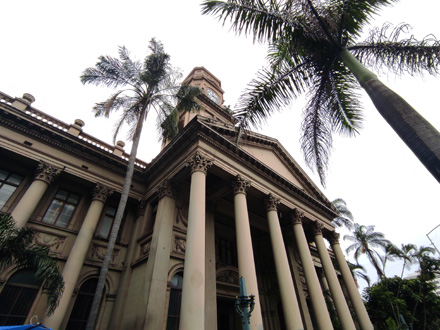
We ended up spending three nights in Durban, and felt much safer in this cosmopolitan city of 3 million inhabitants than we did in Cape Town.

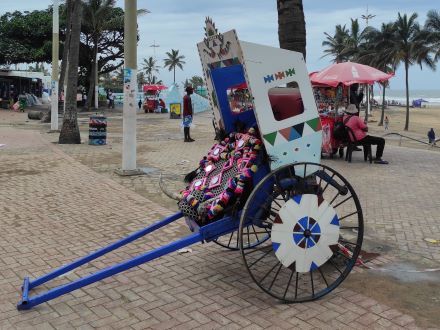
Our wait in the busy taxi rank station for a transfer to the Eswatini border was no less than seven and a half hours! We joined a bunch of Eswatini factory workers heading home to their husbands and children for Christmas. The ladies had a real festive mood, but it was well after dark when we finally hit the border. We jumped out and fumbled through muddy paths in the dark (load shedding again!) looking for the lodge on the South African side, leaving the border crossing for daylight hours.
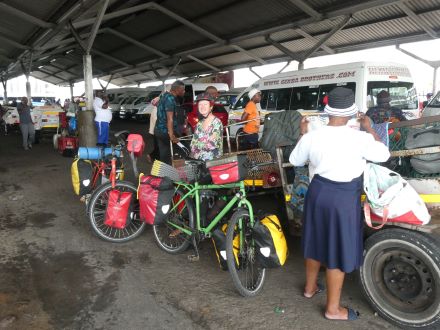

Our two months in South Africa were phenomenal. The stunning scenery coupled with an extraordinary hospitality we have not experienced anywhere to date, made our stay very special. There was unfortunately always an underlying current regarding security and we found the racial divide hard to digest. Although it has been almost 30 years since Apartheid, there are still a lot of issues to be resolved. If, for a start, poverty and employment were tackled, South Africa would be on the road to recovery.
It’s not going to be an easy journey. Politics and corruption often get in the way. However, we were happy to meet quite a few young people of all colours with an optimistic outlook for their future. Let’s hope South Africa can harness this positive youthful energy and make the country lekka (great) again.
